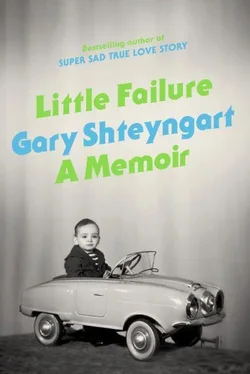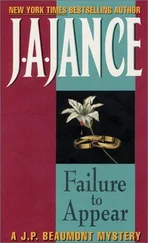Maybe that’s why I’m taking Jonathan back to Leningrad. I am telling Jonathan something I can never say to the boys and girls of SSSQ. That I am not some kind of Gary Gnu antelope whatever-the-fuck who is there to act crazy for their amusement. That I am a Russian boy, of Jewish lineage, sure, but a Russian boy from Russia, with half his life spent in that country.
And Jonathan, because he is a true friend, will go there with me.
Coincidentally Gnu lived there .

My father stops hitting me. Perhaps it’s because I’m a little taller now, my jumble of sweaty dark black hair hanging just a few inches below his thick lips. Perhaps it’s American life, Jonathan’s family, slowly seeping into him. The last time he gives me “one across the neck,” I’ve allegedly been a grubiyan (a “boor”) to my grandma Polya. I suppose I have been rude to her, refusing to let her hold my hand as we cross the violent streets of Forest Hills (I am almost fifteen) and not being as appreciative of her eight-course meals now that each bite of a Klondike bar goes right to my tits. But also I can sense my grandmother’s decline. Every year her mental faculties are withering, and the American drugs aren’t helping. A series of strokes are about to commence, reducing her to a wheelchair, one side of her body inoperable. Even before that happens, I want to withdraw from her. I cannot allow the woman who loves me so much to die slowly before me. I have to look away.
And so my father gives me one across the neck. Fine. Good. I simmer quietly in my room. Every penny I earn doing chores has been spent decorating my bedroom to resemble the office of J. R. Ewing, the villain of the television show Dallas . Luckily, it already has the right wood paneling, and to further the vibe I’ve installed a desktop computer, a fancy-looking Panasonic telephone with an LCD, and a luxurious chair from the dump. All I need is the model golden oil derrick to make the look complete. But even without the derrick, whenever I feel blue I stride into my so-called office, grab the expensive phone, and, with what I think is a Texan accent, shout into the receiver, “Hi darlin’! You just hang tight, y’hear?”
After giving me one across the neck, my father comes into my bedroom, and I brace my neck for another one. “Let’s go for a walk,” my father says. He seems sad. I sigh and shuffle the pile of carefully typed stories I am about to submit for rejection to Isaac Asimov’s Science Fiction Magazine .
We walk through the blooming Deepdale Gardens, past all the places where my father has entertained me with his Planet of the Yids tales and where he has given me the podzhopniks , the little side kicks in the ass. But those kicks symbolize gaiety and our funny father-son bond. Today, Papa is serious, and my neck is tense. He is taking his time with what he wants to say, and usually words just roll off him in thick bursts of anger or glee or philosophy. We are passing the five skyscraper-high, insect-like air traffic antennas down the street from us with their fearsome signage: WARNING THIS FACILITY IS USED IN FAA TRAFFIC CONTROL. LOSS OF HUMAN LIFE MAY RESULT FROM SERVICE INTERRUPTION. ANY PERSON WHO INTERFERES WITH AIR TRAFFIC CONTROL … WILL BE PROSECUTED UNDER FEDERAL LAW.
I do not want to be prosecuted under federal or familial law. Or maybe I do. “Listen,” Papa says. “I shouldn’t have hit you. You were rude to your grandmother, but I shouldn’t have hit you. I behaved badly.”
I rub my neck and shrug. “It’s okay,” I say. But what I want to say is: Don’t you want this? Don’t you want to keep hitting me? Don’t you love me anymore? Or am I so bad that I am beyond the redemption of getting one across the neck?
You have not behaved badly, Papa. Only I can behave badly. I am the child. You are the father. How can you say such an awful thing?
We pass by the basketball court where I’ve hit so many backboards and missed so many hoops with my imprecise aim, my fingers, my arms, my lungs straining to make good for him. We talk about fishing, cars, the odds of my getting into Stuyvesant, the specialized science high school in Manhattan where the tuition is free. My father will yell at me again. And threaten me. And be disappointed in me. But without his hands upon me, the family romance is over. Just like my asthma is over. Now I am supposed to be the man. To learn to hit and earn and make others fear me. How many fingers am I holding up, Vinston?

The children of the Solomon Schechter School of Queens have gathered at the Forest Hills Jewish Center to hear my best friend, Jonathan, still a sweet little boy in his purple nylon graduation robe, recite a prayer for peace and against nuclear annihilation. We will then sing the Israeli national anthem and graduate. My family is also about to graduate, from our garden apartment to a real house with a forty-by-sixty-foot backyard in a different, slightly more affluent, part of Little Neck.
A yearbook of essays and photographs has been prepared. On one page, two young Jewish girls have submitted essays entitled “DEATH,” “FEAR,” and “THE TERRIBLE PAIN” next to a drawing of the Grim Reaper. Male children are supposed to shroud their inner life with so much active horseshit, but these girls are honestly scared of death, scared of the void, scared of the terrible pain that precedes death for a good 80.3 years in the United States. Who would have known the general sadness and anxiety — beyond the sadness of adolescence, beyond the anxiety of being Jewish — have infected the tiny hallways and tidy Bionic Woman lunch boxes of Solomon Schechter?
On another page, there is a photograph of a smiling Israeli kid mock punching me in the face, his hand choking my neck, as I mock cringe in fear. Next to that is a photograph of bearded Mr. Korn in a yellow plaid doozy of a shirt about to hit me over the head with a rolled-up copy of the Times . The look on my face says: I love this man .
Twenty-five years later, Jonathan and I will become friends again, after drifting apart as good childhood friends with traumatic schooling often need to do. We will return to our alma mater, a diminished place where more than a third of the kids are now from the former Soviet Union, mostly Bukharan Jews from Uzbekistan who have settled this stretch of Queens. Mrs. A is still there, looking remarkably young and vital. She remembers Jonathan and, in particular, his pretty mother, but not me. “You’re an author?” she asks me. “Do you do anything else?” She’ll send us on our way with the mission of spreading the good word about Solomon Schechter education. “Prove to them our graduates aren’t ax murderers!”
I attend the twenty-fifth SSSQ reunion at the Forest Hills Jewish Center. The scene has changed only slightly. There are a lot of bald machers and their gleaming wives, entire tables speaking in Hebrew, teachers shushing us, a “Chinese auction” of vaguely Chagallesque paintings, a hired comedian making jokes about Hispanics and Iranians. “We taught you Chumash ,” *a new but familiar-sounding female authority figure is screaming at us, “but we didn’t teach you manners. Stop talking! I have a hostile audience here!”
And as I glance around at my former classmates, a thought occurs to me. This is a community . These people know one another, understand one another, came of age with one another. They were tied by kin and outlook, as were their parents. As were their parents before them. Moms making rugelach in advanced baking ovens, dads talking mileage on their new Lincolns, the drowsy, hypnotic hum of cantors and rabbis on Saturday mornings. What happened here, this was nobody’s fault. We Soviet Jews were simply invited to the wrong party. And then we were too frightened to leave. Because we didn’t know who we were. In this book, I’m trying to say who we were.
Читать дальше













